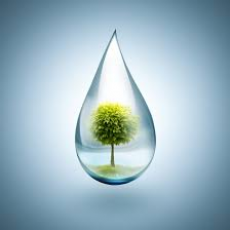

Disrupted Water supplies
Unhealthy hydrology- problems with water quality. The human pressures on rivers is enormous- they are used for transport, for industrial processes, for drinking and selvage disposal. Rivers in industrialising nations like India and China experience especially damaging impacts because, as yet, they have few laws in place to protect their water and ecosystems. River pollution in rivers outside Europe and North America is often appalling.
One cause that can lead to too much overland flow and slow and the flooding in deforestation. Without trees to intercept and store rainfall, overland flow is more likely to occur. In unvisited areas, there soil covered by tarmac and concrete. As a result, rainwater travels much more quickly towards the nearest river via overland flow. Drainpipes also speed up urban water flows.
Water stores have to be carefully managed if they are to remain a sustainable resource. Water stores are naturally recharged whenever it rains. However, if too much water is taken from them too quickly then they will dry out before they have a chance to recharge.
An aquifer is an underground store of water, formed when water-wearing (permeable) rocks lie on top of impermeable rocks.
Small scale water management
A hand pump helps the populations lives by enabling them to have clean water and not have to walk as far to get it. This will enable people to have a better education, and therefore be healthier. It also enables people to feed their crops and use the clean water for cooking, cleaning etc.
A hand dug well helps the population by enabling them to have clean water and not have to walk as far to get it. This will enable people to have a better education and therefore be healthier. It also enables people to feed their crops and use the clean water for cooking, cleaning etc. it also provides a more stable water supply, as it holds water, rather than pumping it.
How can small scale water management be socially, economically and environmentally sustainable?
Social
allows children to have a better education and a good job in the future as they don’t need to collect water- this improves standard of living
Better health as less chance of disease therefore healthier community and less strain on health care
Less deaths
More food available as more water to grow crops
Economic
allows communities to build up and work together
More crops, so can sell more, more income
Better jobs due to improved education which improves overall economy
Jobs in maintaining wells etc… helps communities with lack of jobs
Environmental
better water supply for people and crops/ animals
Not overusing land
Helps animals as more water and food
Cleaner water so less disease

0 Comment:
Be the first one to comment on this article.